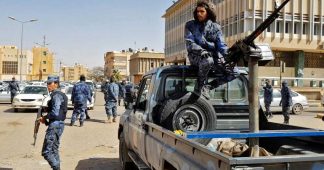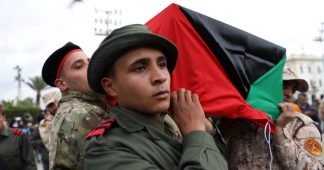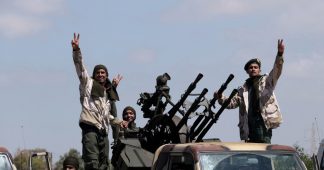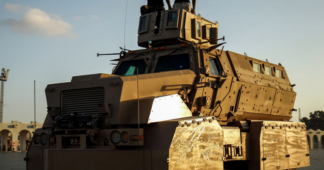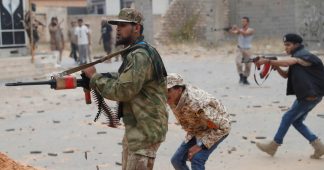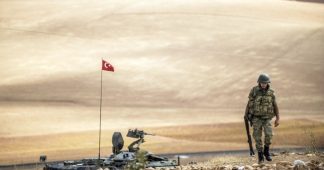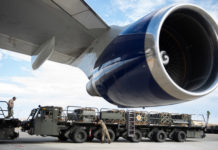5 Dec 2019
The Libyan warlord’s growing ties with Tel Aviv not only contribute to the turmoil gripping Libya but also undermines its internationally-recognised government.
Over the past few years as Libya grappled with conflict, chaos and fragmentation, renegade warlord Khalifa Haftar, who controls the port city of Benghazi, has cultivated strong military ties with Israel to boost his armed campaign against the UN-recognised government of Fayez al Sarraj.
Haftar has convinced Israel and other regional players, such as the UAE, Saudi Arabia and Egypt, that his foriegn policy goals compliment theirs. In return, Haftar has received arms and intelligence support that allows him to destabilise the UN-backed Government of National Accord (GNA), which was established in 2016 with an aim to reduce violence and establish some order in the country.
Although Haftar most recently struck a cautious note regarding his ties with Israel, the former military general has attracted a lot of media attention for having backdoor meetings both with the Israeli government and its intelligence agency Mossad.
In one of the meetings, reportedly mediated by the UAE in the summer of 2018, Israel agreed to supply weapons to Haftar-led Libyan National Army (LNA). The cache included sniper rifles and night vision equipment, according to media reports.
Many say his support from Israel is based on the notion that he’s fighting so-called Islamic extremism and Daesh, but US-based journalist Richard Silverstein’s investigation reveals Haftar’s politics is driven more by vengeance and less by establishing peace in Libya. Silverstein quotes a source from the Israeli Defence Forces (IDF), saying: “A friend of our friend – and an enemy of our enemy – is our friend, and Haftar is a friend of Egypt, Jordan and UAE. He also fights Daesh.”
The growing nexus between Israel and Saudi-led Gulf Cooperation Council (GCC) states has been advancing despite Western powers holding conflicting views about Haftar, thinking that his presence could undermine Libya’s post-revolution term. In early July this year, the UN condemned the deadly airstrike carried out in northwestern Libya, killing dozens of civilians. It is widely believed that the airstrike was ordered by Haftar.
The UAE, which is part of the GCC and has growing ties with Israel, was criticised by the UN in June 2017, which held the oil-rich country responsible for supplying helicopters and other military aircraft to Haftar and violating a UN arms embargo.
For Israel, Libya carries a strategic weight. One of its main motives behind aiding Haftar is securing maritime routes in the Eastern Mediterranean — a resource-rich archipelago where Israel has built a gas pipeline to supply gas to Europe. Besides that, Haftar occupies oil-rich territories of Libya from which Israel can potentially benefit.
Born in 1943, Haftar rose to prominence after taking part in the1969 military coup, toppling Libya’s King Idris. As the king was replaced by Muammad Gaddafi, he soon became his top military officer. Gaddafi tasked him with invading Chad in the 1980s, where he was captured in 1987 along with several hundred Libyan soldiers. Gaddafi was quick to disown him and his troops, denying that he had ever sent any soldiers in the region.
Haftar was released, thanks to US intervention, and Washington offered him political asylum in Virginia. He spent the next 20 years there, living close to the CIA headquarters.
To boost the anti-Gaddafi revolt in 2011, Haftar returned to Libya and contributed to the end of the infamous Libyan dictator.
After the killing of Gaddafi, Libya slipped into civil war with several groups seeking control of the oil-rich country. He led one of the armed groups called LNA and ever since he has earned the reputation of being one of the most polarising figures in the country.
Publishrd at https://www.trtworld.com/africa/how-khalifa-haftar-s-secret-ties-with-israel-fuel-chaos-in-libya-31941
